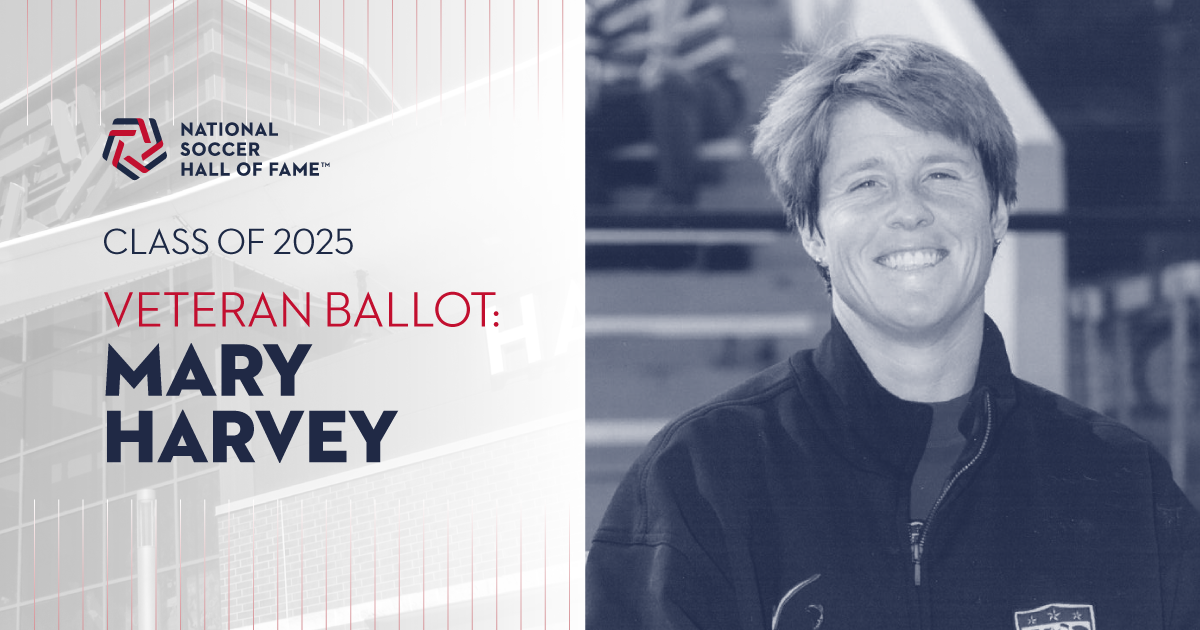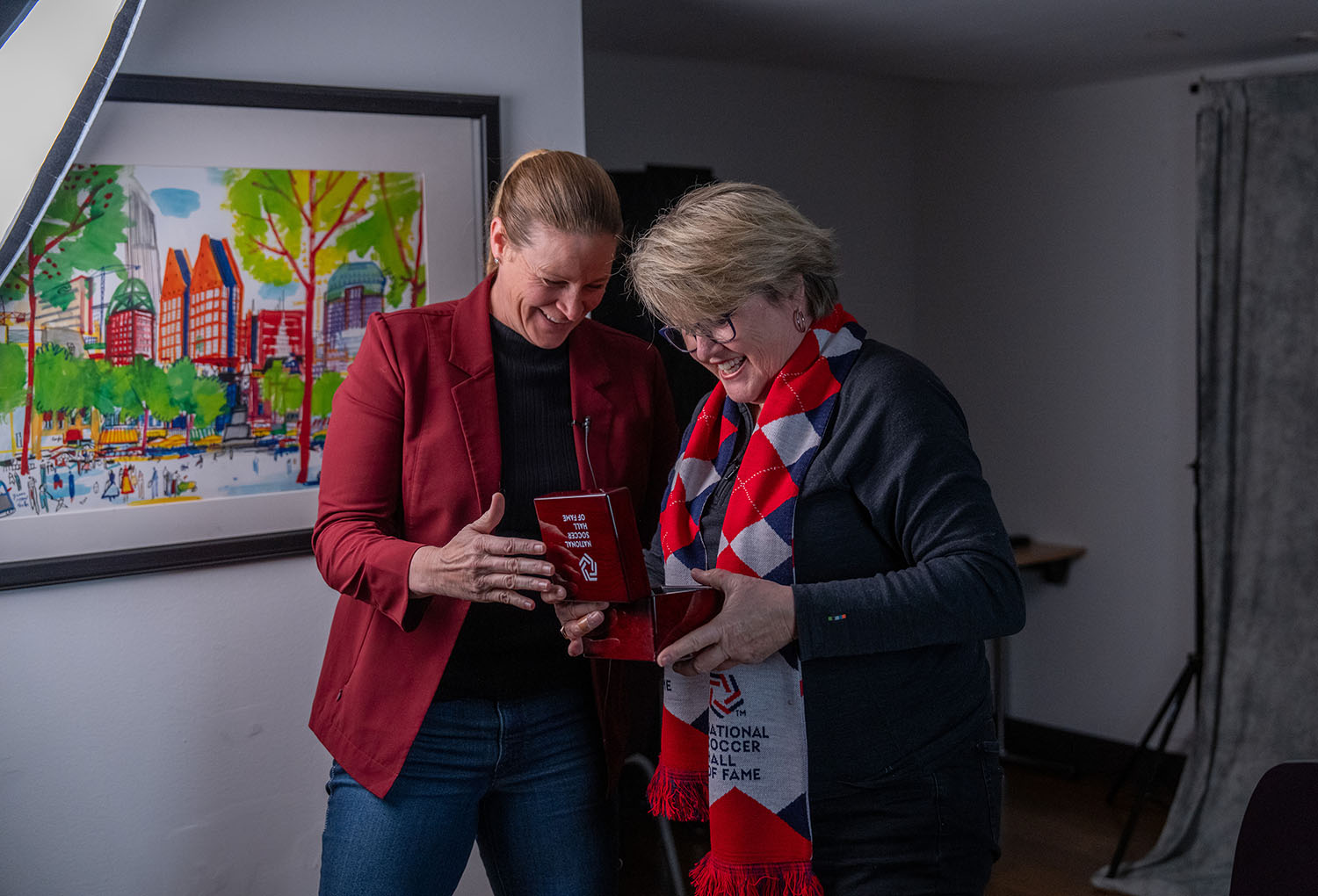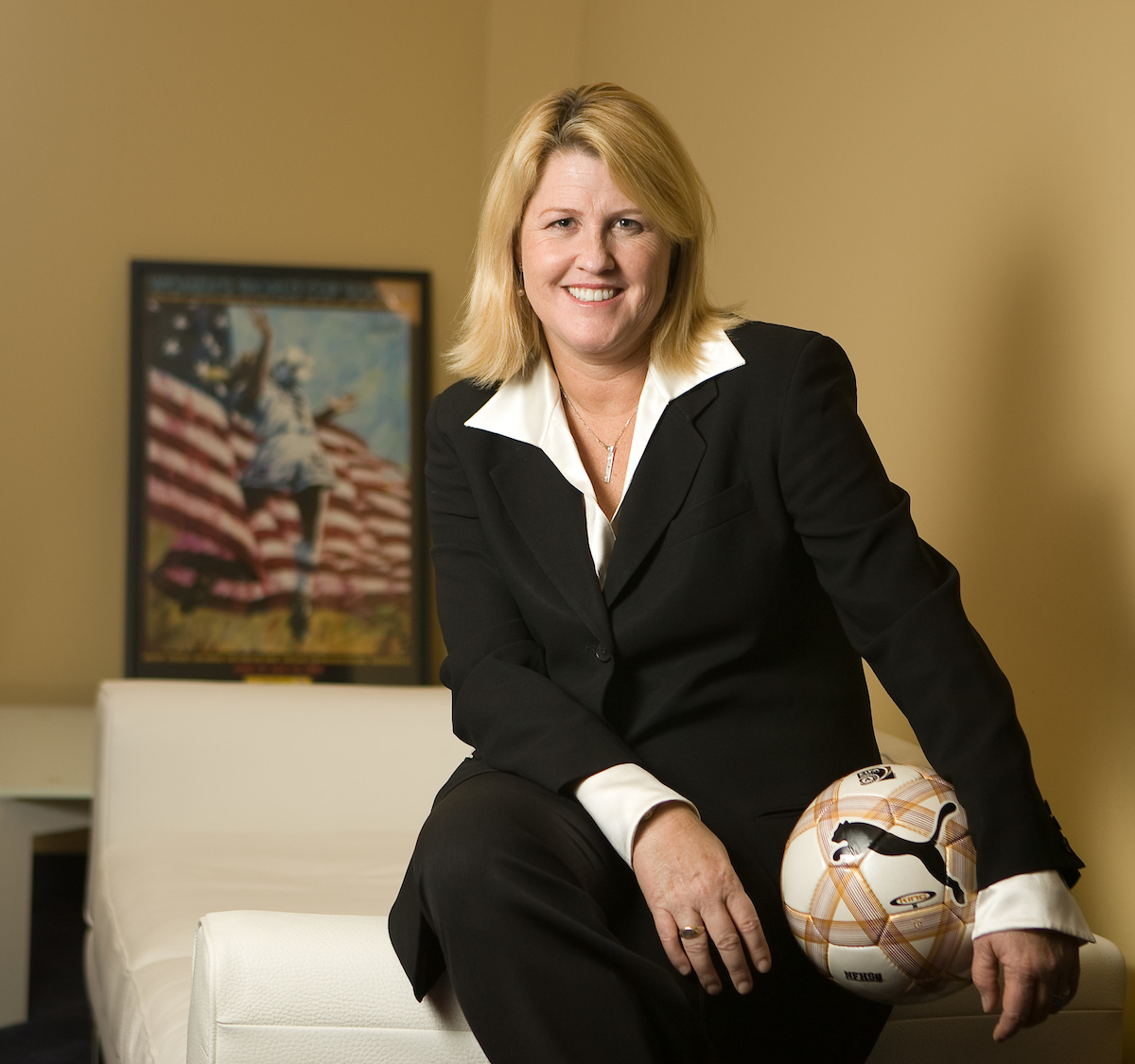Mary Harvey Elected to National Soccer Hall of Fame

When U.S. Women's National Team head coach Anson Dorrance decided which goalkeeper would guard the net in the 1991 FIFA Women’s World Cup, he chose the player with the least amount of international experience.
Mary Harvey, who had but five caps at the time.
Yet, she was getting valuable playing time, at a high level, elsewhere. Harvey was playing regularly in Germany at a time when many women did not have opportunities to compete on a week-to-week basis.
Harvey played every minute of the first FIFA Women's World Cup in China, earning three shutouts on her way to six U.S. victories, including the 2-1 win over archrival Norway in the final. She also was a member of the 1996 Olympic team that won the first women's gold medal in the sport.
“There were so many things I liked about Mary Harvey,” Dorrance told Soccer Today. “Obviously, the classic descriptions of athletes who make it to this level include hard working, competitive, single minded — but to really get into her core, I would say her psychological resilience was my favorite Harvey quality. ... We had other excellent goalkeepers who were more fully embraced by my team — and Mary knew this — but it did not derail her.
“Harvey had a hardness that I really admired.”

After hanging up her gloves for good in 1996, Harvey made a major impact in the second act of her soccer career as an administrator, serving as Chief Operating Officer of Women’s Professional Soccer, FIFA and several human rights and environmentally conscious organizations.
In 2017, Harvey made history as the first woman to win the Werner Fricker Builder Award, the highest honor that can be bestowed upon an individual by the U.S. Soccer Federation. Harvey was worthy of the honor, then-U.S. Soccer President Sunil Gulati said, because of the extent to which she had dedicated her life to positively impacting the game.
“Mary’s determination over the past three decades has paved the way for the advancement of youth and women’s soccer, not only in the United States but across the world," Gulati said. “Her work reflects her passion for the game, which transcends the sport to our everyday society.
“Her legacy as an all-star on and off the field will be cemented into U.S. Soccer’s foundation for many years to come.”
On May 3, 2025, Harvey will receive another prestigious honor when she is inducted into the National Soccer Hall of Fame in Frisco, Texas. Harvey was elected to the Hall of Fame from the Veteran Ballot.

During an eight-year international career, the 5-foot-9 Harvey made 27 appearances for the USWNT, recording 13 clean sheets and conceding only 13 goals. Her record was a sterling 21W-1L-2D, with three non-decisions in matches where she shared netminding duties.
“I’ve always felt I received so much more from the game than I’ve given, and I owe that to my teammates, fellow athletes, U.S. Soccer, FIFA, members of the extraordinary U.S. Foreign Service and the many people I’ve had the pleasure to work with around the world to build the game,” Harvey said after winning the Fricker Award. “Any contributions I’ve made since playing is my way of expressing a love of the game that has given me so much.”
Born in Palo Alto, Calif., on June 4, 1965, Harvey played soccer in high school before blossoming as a dominant goalkeeper at the University of California, Berkley.
“Midway through high school, I went from being sort of an average player to a college prospect,” Harvey told TheStreet.com in 2023. “Even though I was a late bloomer, I ended up going to the University of California, Berkeley, and playing there for four years on their team. The program and the university were a great fit for me.”
As a freshman starter in 1983, she helped the Golden Bears to a fifth-place finish in the NCAA Division I tournament. From there, she led the side to three more playoff appearances, accumulating honors as the NCAA Division I All-Tournament goalkeeper in 1984 and national goalkeeper of the year in 1986. She set several records at Cal, including career saves (156), saves in a game (12), saves in a season (71 in 1986), and clean sheets in a campaign (nine) and in a career (20).
“Harv was a great teammate,” Lesle Gallimore, former college teammate and current general manager of Seattle Reign FC, told Soccer Today. “Reliable, fun to poke fun at, a good sport and a true competitor! She has always been hardworking and a team first person. … She is a leader and continues to give back to the game that we all love and has given all of us so much.”
Harvey graduated in 1987, two years after the USWNT was formed.
“Unless you got picked up by the National Team, there really weren’t a lot of opportunities to play,” Harvey said.
So, she pursued a regular day job at Andersen Consulting, now called Accenture, in its San Francisco office. The company sought volunteers for a long-term program in West Germany for four years.
“I have German ancestry, even though I didn’t speak a lick of German,” Harvey told TheStreet.com. “I thought, ‘Well, I’m starting this new chapter of my life, maybe it’s good for a change,’ because I was giving up something I really loved, which was playing soccer. So, I was on a one-way ticket to Germany in late 1988. And if you’re trying to give up a soccer habit, I don’t recommend moving there.”
At first, it wasn’t easy; Harvey said Accenture was working everyone “pretty hard,” and she was in the middle of a big-time soccer country.
“I missed playing, and it was everywhere around me,” she told CSQ.com. “The newspapers, the news, the culture. So, I joined a local team that just happened to be really good.”
That was FSV Frankfurt. When the Damen Bundesliga kicked off in 1990, Frankfurt became a member. Harvey joined the team as one of the first U.S. women to ply their trade overseas.
American players, men and women, received very little respect in international soccer at the time.
“I had to listen to all kinds of abuse,” Harvey told Our Game Magazine in 2015. “They would ask, ‘How can you be a good player? You’re from the U.S.' ”
Harvey, however, proved to be one of the best keepers in the league. She also was able to keep her day job and her role as a shot-stopping goalkeeper separate, at least for a while.
“I was using my degree during the day, working with financial services people, building a stock options and futures exchange for German banks … and getting an intensive course in how to speak locker-room German at night,” she told CSQ.
But then came the women's German Cup final on May 19, 1990. Frankfurt recorded a 1-0 victory over Bayern Munich before 75,000 spectators at Olympic Stadium in Berlin.
“I blew my cover because I saved a penalty … two minutes before the end of the game, and it was on national television,” Harvey said. “That resulted in some questions on Monday at work.”
It also resulted in an invitation from Dorrance to attend USWNT training camp. She took a vacation from her job, tried out for the team and earned a spot.
“If Accenture had said, ‘Listen, you have to pick, [sport or career],’ I would have been in a tough spot,” Harvey said. “They let me bend the rules as much as possible; they were incredibly supportive. I went on a six-month leave of absence to train and play in the ’91 World Cup, and they let me do it.”
Harvey made her international debut in a scoreless draw with Poland in Sardinia, Italy, on June 21, 1989. She began her career with five consecutive clean sheets, a streak that ended in the Americans' Women's World Cup debut, a 3-2 victory over Sweden. In the 65th minute of that match, forward Lena Videkull snapped Harvey’s scoreless streak at 465 minutes.
The final turned out to be a fierce battle between the two best teams in the world.
The U.S. drew first blood on Michelle Akers’ 20th-minute goal, but the Norwegians equalized nine minutes later when defender Carla Overbeck collided with Harvey, allowing forward Linda Medalen to take advantage and score to pull even.
“That goal shook me up,” Harvey told Our Game Magazine. “I was a different person by the end of that match. It was life-changing. Bad things happen. The only thing you can control is how you respond to it.”
She became a different goalkeeper, for the good.
“I remember thinking, ‘I’m so glad she’s on our side,’ ” Overbeck told Our Game Magazine. “One time, I looked back and Harv was just flying through the air.”
Akers scored the dramatic winning goal in the 78th minute (Women's World Cup matches were 80 minutes then), and the U.S. and Harvey secured a historic 2-1 triumph.
Harvey continued her professional career, transferring to Hammarby IF in Stockholm, Sweden, for the 1993 season before joining U.S. teammates Julie Foudy, Kristine Lilly and Akers at Sweden’s Tyreso Football Club the next year.
She was a member of the 1996 gold-medal winning Olympic team, but she did not see any action at the Games.
Before retiring, Harvey began to leave her mark off the field.
In 1992, she was elected by the players to serve as their representative on the U.S. Soccer board of directors. She did so through 2003, including five years on the executive committee. Harvey established the U.S. Soccer Athletes’ Council and headed the task force that wrote the U.S. Soccer Player Bill of Rights.
FIFA came calling in 2003, hiring Harvey to lead its Development Division after she completed her MBA. The hire helped Harvey make history again; she became the first woman to lead a division with the organization. She oversaw a four-year budget of $640 million and 70 people in 13 offices around the world. During her five-year tenure, Harvey made reforms in FIFA’s financial assistance program and helped establish a FIFA Under-17 Women’s World Cup, among other achievements.
“My five years at FIFA were transformational for me because there were incredible possibilities to have significant impact on opportunities available to different groups,” Harvey told CSQ.com in 2023. “For example, with a little bit of investment, you could make [female referees] significantly better vs. on the men’s side, where it’s more developed.”

Returning to the U.S., Harvey was named Chief Operating Officer for Women’s Professional Soccer, serving in that role from 2008 to 2010. She has served as a sport envoy for the U.S. State Department’s Sports Diplomacy Division on several occasions, which included missions to Iraq, Jordan, Canada and Mexico.
In 2017, Harvey joined the 2026 FIFA World Cup bid team for North America and was responsible for writing the United 2026 Human Rights Strategy, a first for a worldwide sporting event.
That same year, Harvey also founded Ripple Effect Consulting, for organizations using sport to drive social and environmental change. She also was vice chair of the board of directors for the Green Sports Alliance, a U.S. based non-profit organization that that wanted to inspire professional sports teams and leagues to embrace renewable energy and environmentally preferable practices.
In 2019, she became chief executive of the Centre for Sport and Human Rights, a human rights organization for sports.
“As a women’s national team, we didn’t set out to have wide scale impact, but we did,” Harvey said an interview with the Associated Press. “From that, I learned that’s what I wanted my life to be about: the ability to impact others in a positive way.”
